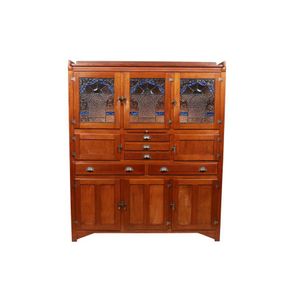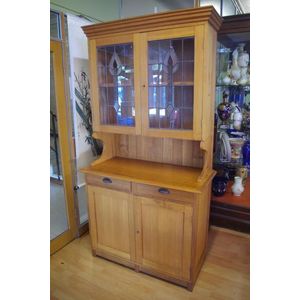An essential feature of every well equipped kitchen, the name derives from the board or table on which meat was 'dressed' or food prepared.
Over time, the design of the dresser has changed, even though the nomenclature is unchanged.
Dressers were particularly popular in Wales, northwest and southwest England, each type having strong regional characteristics.
First introduced in the 18th century, the dresser consisted of a base containing shelves, drawers and cupboards, and an open upper section, with stepped shelves known as the 'rack', for storing plates and other crockery.
Some dressers, particularly from Wales and northern England had panelled backs, while others have open backs so the wall behind the back of the upper section of the dresser is visible.
Alternatively the rack was sometimes attached directly to the kitchen wall rather than remain free standing upon the base, which explains why so many of them have since been
more...
lost.
The base could take many forms. It may be in the shape of a table with drawers beneath the top, sometimes with a 'pot board' beneath, sometimes with a cupboard, three or four side drawers for linen and cutlery, and sometimes with a hutched 'dog kennel' to display cooking pots. Some dressers have a series of small drawers, known as 'spice drawers', beneath the rack shelves.
Dressers in a wide variation of designs continued to be made in the 19th and 20th century, but bear little resemblance to the earlier examples.
The main difference is that the upper section is enclosed with glass doors, and the base would have a row of drawers, with cupboards below, fully utilizing the storage space. Leadlight doors were a feature of dressers made in the early 20th century.
A series of dressers made during the late 19th and early 20th centuries contained an astonishing variety of built-in devices including flour bins, sifters, bread boards and beaters.
In America, the dresser is often called a 'hutch'.
less...


 Loading more...
Loading more...